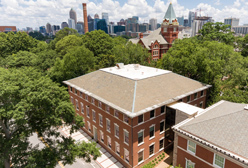Sponsored Research
"Near Peer Service Learning Program," a project by Kamau Bobb, coordinator of educational partnerships for Ivan Allen College of Liberal Arts," was awarded $30,000 by the United Way of Metropolitan Atlanta.
"Crew Research Management Issues Surrounding Single Pilot Operations for Transport Aircraft" by Ute Fischer, research scientist in the School of Literature, Media, and Communication, was funded for $74,370 by the National Aeronautic and Space Administration through San Jose University.
"Federal Cyber Service Scholarships" has received supplemental funding of $293,215 from the National Science Foundation. Seymour Goodman and Patrick Traynor direct this program in The Sam Nunn School of International Affairs. The supplement brings total funding for current scholarships to $1,593,567.
"Social Agents and Robots for Open-Ended Domains," has been funded for $159,148 by the National Science Foundation. Principal Investigators are Brian Magerko, associate professor in the School of Literature, Media, and Communication, with Andrea Thomaz and Mark Riedl of the College of Computing.
"Prioritizing and Planning for the Future: A Study of UIUC CEE Faculty, Staff, and Students," a project by Julia Melkers and Diana Hicks, professors in the School of Public Policy, was funded for $10,000 by the University of Illinois, Urbana.
Other Funding
"Past Present: Resonances of Medieval and Early Modern Culture in Atlanta," a project by Richard Utz, professor and chair in the School of Literature, Media, and Communication, has received a GT Fire Mini-Program grant. The project unites those on our campus interested in medieval and early modern culture for discussions of the medieval and early modern past in a city founded during modern times.
What Does Georgia Tech Think?
Selected Press for Ivan Allen College of Liberal Arts
|
Pearce on Atlanta's Gaming Job Market
"The problem is that people come from Zynga, Blizzard and EA to recruit our students and say 'do you want to move to San Francisco and make a salary two to three times what an Atlanta studio will pay you?'" Pearce told Creative Loafing, "Who would say 'no' to that, right?" Celia Pearce is an associate professor in the School of Literature, Media, and Communication. Source: Creative Loafing, August, 29, 2013
Bogost on Electronic Etiquette
"We rarely admit it, but we all want to be important — yet most of us aren’t," wrote Ian Bogost in the Atlanta Journal Constitution, "Smartphones let us simulate that importance, replacing boardroom urgency with household triviality." Bogost is a professor in the School of Literature, Media, and Communication. Source: Atlanta Journal Constitution, August 29, 2013
Kosal on US Investigations in Syria
“The inconsistencies that have been observed point to the need for verification for real data before any political decisions are made,” said Margaret Kosal on Fox News. The Sam Nunn School of International Affairs professor discussed the factors U.S. officials are looking for to determine the use of chemical weapons in Syria. Source: Fox News, August 28, 2013
Goodman on Online Privacy
“You don’t provide Facebook with a penny,” Goodman said. “So how does Facebook make its money? You are their product. "Well, not you, but everything you post. Pictures. Family names. Where you travel. Pictures of things you like." Seymour Goodman is a professor with The Sam Nunn School of International Affairs. Source: Atlanta Journal Constitution; August 2, 2013
Ries on Tax Reform
“When you lower income tax rates, you lower rates on production, earned income and investing,” Christine Ries, an economics professor at Georgia Tech, told a state Senate study committee July 17. “If you want more of something, don’t tax it.” Source: Atlanta Business Chronicle, July 26, 2013; Rome Tribune, July 22, 2013
Ries on Detroit Bankruptcy
“Those of us who work more closely on state and local economic and reform issues know that Detroit is the first of many. Nearly all reform controversies come down to taxpayers versus unions – especially public sector unions," said Christine Ries, professor in the School of Economics. "In my areas of engagement, educational reform and tax reform, all of the well-funded opposition to reform comes from various public-sector employees’ unions." Source: Somewhat Reasonable, July 19, 2013
Bankoff on International Unrest
"Atlanta needs civic leaders to 'get off the couch' and address the city's problems, or the turbulence in cities such as Istanbul will come to roost here as well...The global issues that live out over there are here," said Joseph R. Bankoff, chair and professor of the practice in The Sam Nunn School of International Affairs. Source: Global Atlanta, July 17, 2013
Santesso on the Modern Surveillance State
LMC Associate Professor Aaron Santesso and co-author David Rosen were interviewed regarding the recent publication of The Watchman in Pieces: Surveillance, Literature, and Liberal Personhood , which was published this month by Yale University Press. There was an article discussing the publication as well. Sources: Pen/America and slate.com, July 8, 2013
Head on MOOCs
"The most rewarding aspect of the course is the weekly “Hangout” session, live-streamed using Google Air. We invite students to join the discussions and ask questions. " Karen Head, assistant professor in the School of Literature, Media, and Communication, discussed her experiences teaching a MOOC in The Chronicle of Higher Education. Source: Chronicle of Higher Education, June 21, 2013
Pollock on Enbrel and the Autoimmune Era
"It may be tempting to conclude that Enbrel is just a luxury drug, but it actually does improve quality of life for many people suffering from severe joint pain. Moreover, it provides a more general lesson about our contemporary experience of health and disease in the post-industrial economy," wrote Anne Pollock, an assistant professor in the School of Literature, Media, and Communication, in an article in the The Atlantic. Source: The Atlantic, June 18, 2013
Lux Poem on Garrison Keillor
"To Help the Monkey Cross the River," a poem by Thomas Lux, professor and Bourne Chair in Poetry in the School of Literature, Media, and Communication, was read by Billy Collins on The Writer's Almanac with Garrison Keillor radio show. Source: The Writer's Almanac with Garrison Keillor, June 18, 2013
Ries on Film Industry Taxes in Georgia
"States have been bidding against each other, giving higher and higher exemptions, offering better and better deals for the film industry, and you imagine that at some point, if all states are awarding exemption, we are back where we started," Christine Ries, professor in the School of Economics, discussing negative possibilities of film industry tax breaks in Georgia. Source: Fox News, June 5, 2013
September 14, 2013
8:00 pm
September 14, 2013
10:00 pm
September 16, 2013
4:00 pm
September 16, 2013
5:00 pm
September 17, 2013
4:30 pm
September 18, 2013
4:30 pm
September 19, 2013
11:00 am
September 19, 2013
11:30 am
September 19, 2013
3:00 pm
September 20, 2013
2:00 pm
September 23, 2013
4:00 pm
September 26, 2013 - September 28, 2013
4:00 pm
September 27, 2013
2:00 pm
September 30, 2013
4:00 pm
October 25, 2013 - October 27, 2013
8:00 pm
November 11, 2013
4:00 pm
November 12, 2013
6:00 pm
November 13, 2013 - November 14, 2013
6:00 pm
|

|
World S&T Policy Scholars Convene at Georgia Tech
Science and technology policy experts from around the around the world will convene at Georgia Tech September 26-28 for the 5th biennial Atlanta Conference on Science and Innovation Policy organized by the Ivan Allen College School of Public Policy.
The preeminent conference for S&T policy-makers, the Atlanta Conference will bring together more than 300 researchers from more than 35 countries including both developed and developing nations. The conference addresses the multidimensional challenges and interrelated characteristics of science and innovation policy and processes. Co-chairs this year are Professors Diana Hicks and Julia Melkers, with Honorary Chair Susan Cozzens.
Sessions will explore focus on research addressing the broad range of issues central to the structure, function, performance, and outcomes of the science and innovation enterprises. In addition to plenary talks and parallel paper presentations the conference features a young researcher’s poster competition.
For more information, visit the Atlanta Conference on Science and Innovation Policy.
|
Africa Atlanta 2014 will raise Atlanta's Profile as a Global Nexus for Innovation
President Obama’s July trip to Africa signals intent to reanimate U.S. relations with the continent. In light of this goal, Atlanta’s star continues to rise as a global vortex in which transportation, business, technology, logistics, research and development, energy and environment, health, education, cultural expression, and more form a new leading edge for innovation and global interaction.
 This visit underscores the timeliness of the Africa Atlanta 2014 initiative which is recasting perceptions of relationships among Africa, Europe and the Americas and making way for the abundant potential for positive action. In Atlanta, this potential calls for concerted collaborative action. This visit underscores the timeliness of the Africa Atlanta 2014 initiative which is recasting perceptions of relationships among Africa, Europe and the Americas and making way for the abundant potential for positive action. In Atlanta, this potential calls for concerted collaborative action.
Key strategies include:
- Highlighting existing connections among Africa, Europe and Atlanta across the metropolitan Atlanta area.
- Creating a digital “clearinghouse” for understanding who is doing what where and what the linkages among endeavors might be.
- Establishing a think tank for identifying strategies and creating a springboard for connecting local and global economic opportunities.
- Positioning the robust connections between cultural and economic imperatives as dimension of the success of Atlanta as a global gateway.
- Raising awareness of colleges and universities as assets in enhancing and sustaining vibrancy in local/global connections.
Moreover, as dean of a college at a university where young people are not content to stand by and observe, I see yet another enhancement for this opportunity. I am inspired by the burning desires of our students to learn, to act and to lead — and to do so with respect for and consideration of those around them. I believe that this spirit of engagement is true, or could be, of youth around the globe, and perhaps especially so in Africa, where we have one of the world’s fastest-growing global markets. These globally aware, Internet-enriched youth are shaping a new dynamic and amplifying a potential that is borne out by President Obama’s current African trip, focused on economic development, democracy and youth.
Africa Atlanta 2014 is a proving to be a powerful vehicle for bringing to the fore the city’s capacity to meet this critical opportunity. It is a year-long series of events designed to explore the combined potential of economic and cultural imperatives with the intention of identifying strategic actions.
Business comprises a vital component for success with this effort, and we look to the Atlanta business community to partner with us in galvanizing initiatives for cohesive impact. With the support of Mayor Kasim Reed, the Consulate Generals of Belgium and France, and more than 25 anchor partners across the city, we have developed a mechanism for leading the nation in reimagining our connections with Africa and achieving ambitious national goals.
Now is the time, and Atlanta is already on its way. We have a distinctive opportunity to advance the city as the nexus for holistic action in development and sustainability — economic, cultural, social. The business community is a key player in this innovative model for collaboration.
Africa Atlanta 2014 was conceived and is spearheaded by Jacqueline Royster, Dean, Ivan Allen College of Liberal Arts. This article is drawn from an op-ed entitled A new catalyst for global Atlanta that appeared in the Atlanta Business Chronicle in June.
Africa Atlanta 2014 kicks off October 15, 2013 ( see article below for more details). A full schedule will be available soon on the website.
|
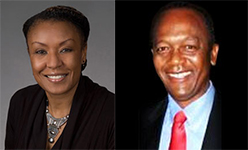
|
Africa Atlanta 2014 Kicks Off with Reflections on Africa Then and Now
Africa Atlanta 2014 begins October 15 with a series of fall events that precede next year's formal opening. Reflections on Africa Then and Now brings to campus international affairs expert Haskell Ward, and former Georgia Supreme Court Chief Justice Leah Ward Sears.
Ward is a former U.S. deputy assistant secretary of state with special responsibilities for American relations with Africa. He is currently senior vice president of government relations at Black Rhino.
Both Ward and Ward Sears are members of the international board of Africa Atlanta 2014. Ms. Ward Sears currently leads the appellate practice of the law firm Schiff Hardin LLC.
"Leah Ward Sears and Haskell Ward bring to the fore precisely the kind of contemporary trans-Atlantic cultural and economic perspectives and connections that we are showcasing through Africa Atlanta 2014," said Dean Jacqueline J. Royster. " We are very pleased to present their expertise as part of Africa Atlanta 2014 and to have them help guide and grow this initiative."
The fall pre-events are being posted to the Africa Atlanta 2014 calendar so watch for details.
|
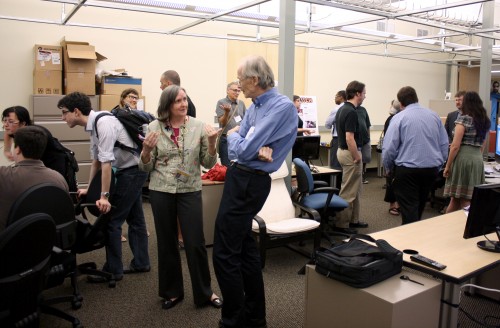
|
DiGRA Conference Highlights Evolving Games Studies
Game studies may be a relative newcomer to the academic arena, but its emergence during the past decade has brought an explosion of interdisciplinary discussion and cooperation.
As one among the first institutions in the world to initiate game research and having offered humanities-based game studies courses since 1999, Georgia Tech is at the forefront of that discussion.
“As long as I’ve been here, since 2006, Georgia Tech has been associated with games,” said Celia Pearce, associate professor in the School of Literature, Media, and Communication (LCC) specializing in games research and media arts. “Being situated within the humanities, we are focused on producing well-rounded, technically savvy, and culturally-well-informed practitioners. Students are led to understand cultural history and importance; not just the technical aspects, but where it fits into the larger trajectory.”
Pearce recently co-chaired the prestigious annual conference for the Digital Games Research Association (DiGRA), the premiere international association for academics and professionals who research digital games and associated phenomena. Hosted by Georgia Tech August 26-29, the conference brought together a diverse international community of interdisciplinary researchers engaged in cutting edge research in the field of game studies. 17 presenters at the conference were Georgia Tech’s very own, including eight faculty members, three grad students, and six alumni.
The theme of this year’s conference was Defragging Game Studies: “frag” is video game parlance for the temporary killing of another player. “Defrag” means reducing file fragmentation on a computer. The theme highlighted the diverse methods and perspectives of game studies and questions about whether or not game studies should split into discipline-centered communities or grows cohesively as an “interdiscipline” that includes humanities, social sciences, psychology, computer sciences, design studies, and fine arts.
So what did the conference reveal about the future of game studies?
Game studies scholarship, like digital media design and game design, is a collective cultural process of inventing shared conventions of representation. Just as game design is centered indiverse disciplines including anthropology, sports studies, cognitive science, and performance studies, game studies draws from multiple disciplines. Controversies over definitional boundaries reflect the threshold between old and new cultural forms, but awareness of the liminal nature of games, game design, and game studies offers a horizon for sharpening critical focus and expanding understanding.
As Georgia Tech looks toward the future in game studies, “defragging” and collective invention will define the work of our humanities-influenced, yet technically savvy students and practitioners, unifying research under one interdisciplinary umbrella to better utilize the diversity of methods and perspectives of the game studies research community.
Learn more at www.dm.gatech.edu and at games@gatech.edu
|
Goldberg Book Named Choice Magazine Outstanding Academic Title
|
|
A book by Stuart Goldberg, associate professor in the School of Modern Languages, has been named a 2012 Outstanding Academic Title by Choice: Current Reviews for Academic Libraries, the leading U.S. source for reviews of academic books, electronic media, and Internet resources in higher education. Goldberg's Mandelstam, Blok and the Boundaries of Mythopoetic Symbolism (The Ohio State University Press, 2011,) explores the ongoing role that the poetry of Russian Symbolism played in Osip Mandelstam’s creative life. Mandelstam (1891–1938) was an instigator of Russia's "revolution of the word." He was exiled under Stalin and died in a Gulag. He is considered a luminary of both Russian poetry of the twentieth century and world poetry. Goldberg illuminates the poet’s productive play with distance and immediacy in his assimilation of the Symbolist heritage. In announcing the selection of Goldberg's book, Choice noted, "The greatest value of this book lies in Goldberg’s intelligent, perceptive, and enlightening interpretations of individual poems, not only as they fit into Mandel’shtam’s oeuvre but also as they relate to ‘early’ symbolists.” |
Jackson Receives 2013 Fulbright Scholarship to IEA Seminar in the UK
Stephanie Jackson, Assistant Director, Undergraduate Advising & Professional Development in The Sam Nunn School of International Affairs, has received a Fulbright International Education Administrator Award (IEA) to the United Kingdom.
Jackson is among the initial cohort of twenty U.S. international education and senior-level university administrators that were awarded the grant.
The Fulbright Program is the flagship international educational exchange program sponsored by the U.S. Department of State and is designed to increase mutual understanding between the people of the United States and the people of other countries. The IEA program in the UK is designed to familiarize U.S. higher education administrators with the United Kingdom’s higher education systems, society and cultures through campus visits, cultural events, meetings with government officials and briefings. Interactive sessions of U.S. and U.K. administrators will be facilitated to share best practice in both directions across the Atlantic.
At the seminar this summer, Jackson worked to expand the international reputation of both The Sam Nunn School of International Affairs and the Ivan Allen College of Liberal Arts. Her selection for the IEA award leveraged her role as advisor for Georgia Tech's International Plan and built on the Institute's Strategic Plan to graduate good global citizens.
"A significant component of the strategic plan is the globalization of our education with emphasis on cultural competency. This Fulbright award allowed me to enhance, influence and inform these strategic plan implementation steps as The Nunn School and Georgia Tech collaborate to promote global leadership."
Jackson manages the full range of student support services for undergraduates, as well as, career development for all graduate students in The Nunn School and leads career initiatives for the Ivan Allen College of Liberal Arts. She is a past president of the Georgia Tech Academic Advising Network (GTAAN) and has been recognized at the college, Institute, and state level for her exemplary performance. She has a Master’s of International Affairs degree in International Development from Ohio University and a Bachelor’s degree in Political Science from Howard University. She is an active liaison with the Association of Professional Schools of International Affairs and a member of the Georgia Association of International Educators and the National Academic Advising Association.
For more information about the Fulbright International Education Administrators programs, visit their website.
|

|
Tolkien, Not Orwell, Understood Today’s Spying
What can literary fiction teach us about recent revelations that the National Security Agency has aggressively been gathering massive amounts of data on American citizens? Aaron Santesso's new book offers intriguing perspectives.
The Watchman in Pieces: Surveillance, Literature, and Liberal Personhood (Yale University Press, 2013) examines the role literature can play in understanding surveillance. Santesso, an assistant professor in the School of Literature, Media, and Communication, and co-author David Rosen cover nearly 500 years of cultural and social history in examining how literature and surveillance have developed together - kindred modern practices. As ideas about personhood—what constitutes a self—have changed over time, so too have ideas about how to represent, shape, or invade the self.
The novel one usually turns to, of course, is George Orwell’s Nineteen Eighty-Four, with its terrifying vision of the Thought Police. According to Santesso and Rosen, Orwell’s book isn’t the most compelling or accurate literary prediction of modern surveillance. They choose a less obvious title: J.R.R Tolkien’s Lord of the Rings.
Tolkien’s most potent and intimidating image of centralized surveillance, the Eye of Sauron atop a tower, taking in the whole world, has resonated with those concerned about government monitoring. But it’s Sauron’s vulnerability that has the most relevance for America today. Consider the basic premise of Tolkien’s trilogy: a small group of dedicated subversives willing to sacrifice their lives slips in under the surveillance system of a great power, blends in with an alien population, and delivers a devastating blow to the heart of its empire, leaving its security forces in disarray and its populace terrified. Far from being covert, much of this operation is conducted in plain sight, with the great power aware of its enemies’ existence, if not their intent. Given its prescience about modern-day terrorism, the authors contend that Tolkien’s vision offers at least three lessons for present-day America.
The Watchman in Pieces: Surveillance, Literature, and Liberal Personhood
Santesso and Rosen were interviewed about the book by PEN America. The full interview can be found here.
Read more
|
Alumnus Di Minin Appointed Advisor for Innovation Policy in Italy
|
|
School of Public Policy alumnus, Alberto Di Minin, has been appointed as Advisor for Innovation Policy to the Italian Minister of Research, Maria Chiara Carrozza, in the new government of Italian Prime Minster Enrico Letta. Di Minin received his Master's of Science in Public Policy from the Georgia Institute of Technology in May 2002, focusing on regional development and innovation policy, and his Doctorate in City and Regional Planning at the University of California, Berkeley, in 2006. He is an assistant professor of strategy in the Institute of Management Department of Economics and Management at the Scuola Superiore Sant'Anna, Pisa, Italy, and a research fellow with the Berkeley Roundtable of the International Economy. |

|
Kosal Discusses Syria's Use of Chemical Weapons on Fox News
Margaret Kosal, assistant professor in The Sam Nunn School of International Affairs, discussed the factors U.S. officials look for to determine the use of chemical weapons in Syria on Fox News.
See the whole interview.
|
Goonan Among Popular Science's "Best Science Fiction Writers Imagining the Future"
Kathleen Goonan is featured among Popular Science Magazine's "Best Science Fiction Writers Imagining the Future." Goonan, professor of the practice in the School of Literature, Media, and Communication, has been teaching Science Fiction for LMC for the last few years. She was featured in the July 2013 issue of Popular Science Magazine and online in an article entitled: "Dispatches from the future: The best minds in science fiction describe how we will live and work--on Earth or in space--in the decades and centuries to come."
|
Brown Credited in Atlanta Business Chronicle's Who's Who Sustainability
Marilyn Brown, professor in the School of Public Policy, was credited in the Atlanta Business Chronicle as one of the Who's Who in Sustainability in June. As explained in the article, "Brown leads the Climate and Energy Policy Lab at Georgia Tech, and she is a national leader in the analysis and interpretation of energy futures."
|
New Faculty for Fall 2013
School of Economics

Assistant Professor
Matthew E. Oliver received a B.B.A. in Business Economics from the University of Memphis and his Ph.D. in Economics from the University of Wyoming. His primary fields of expertise are environmental and natural resource economics and international trade and development. Oliver’s research interests focus on energy resources and energy infrastructure, particularly natural gas markets and interstate pipelines.
School of History, Technology, and Society
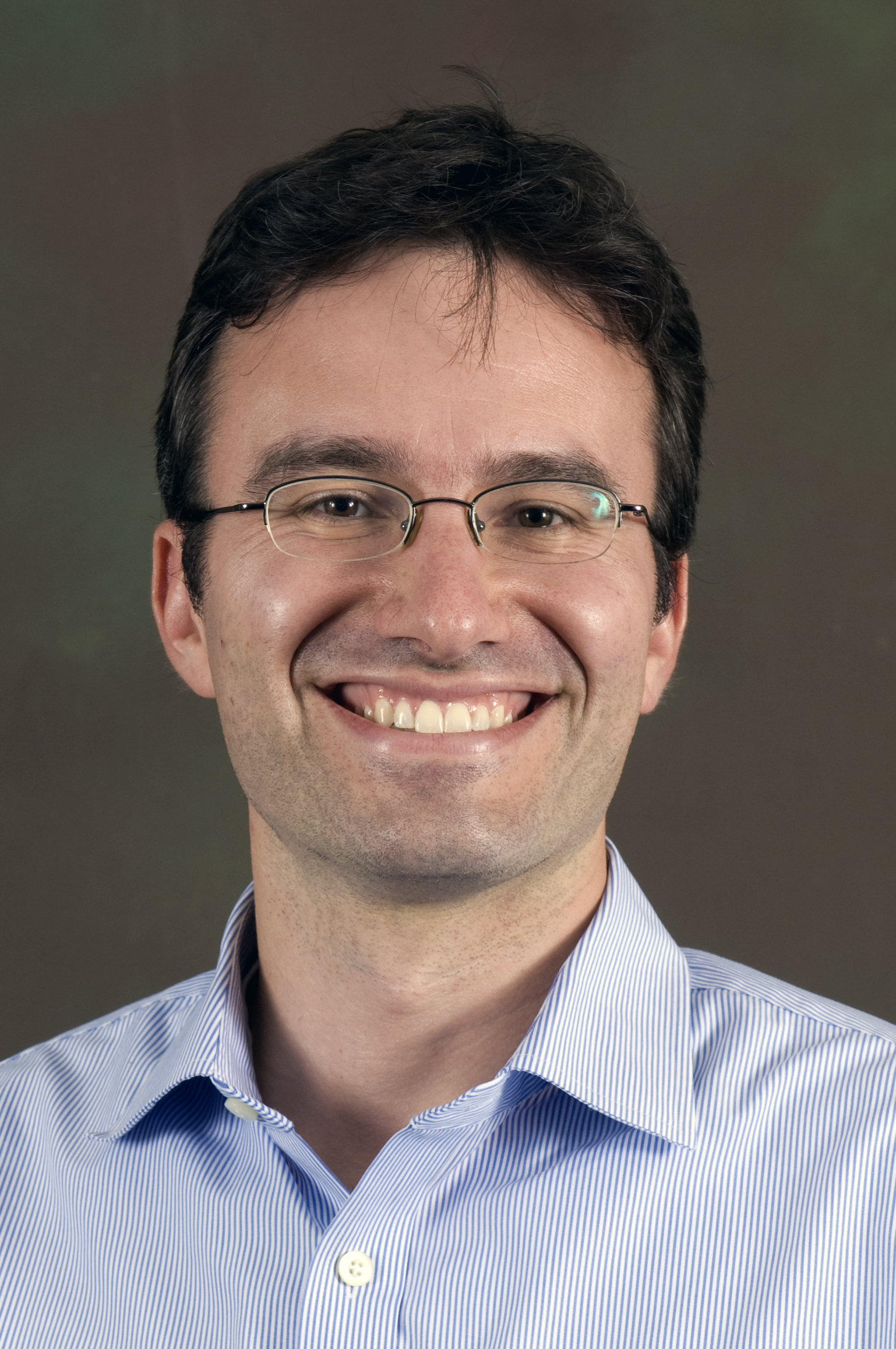
Assistant Professor
Daniel Amsterdam holds a B.A. from Yale University, an MAT from Brown University, and Ph.D. and Graduate Certificate in Urban Studies from the University of Pennsylvania. He comes to Georgia Tech from Ohio State University, where he taught modern U.S. History and American Urban History for four years.
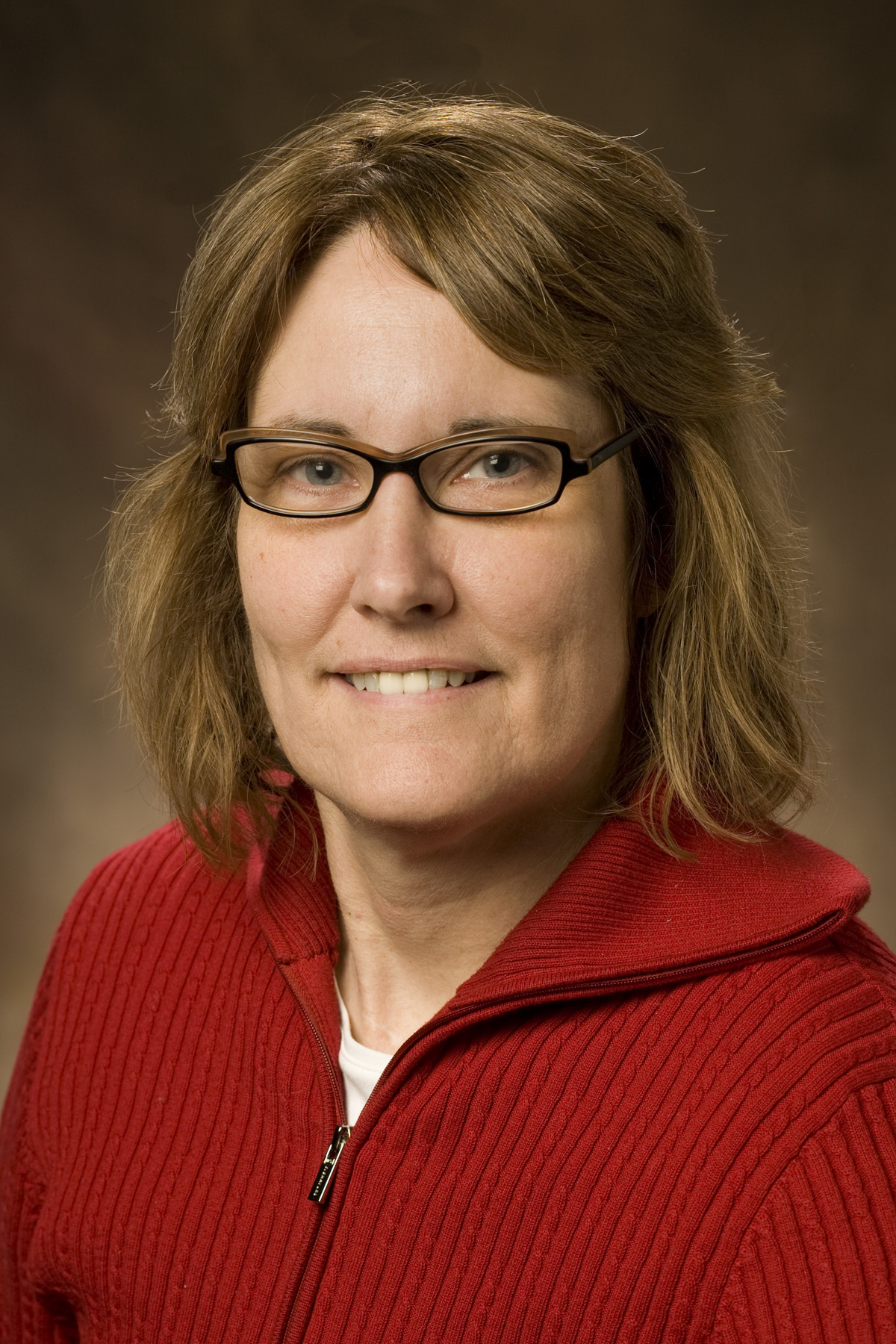
Mary G. McDonald, Ph.D.
Homer Rice Chair in Sports and Society
Mary G. McDonald holds a Ph.D. from the University of Iowa. McDonald was previously a professor of sociology at Miami University in Ohio and is a past president of the North American Society for the Sociology of Sport. She has edited special issues of the Sociology of Sport Journal devoted to (Post) "identity and sport" and "whiteness and sport" and is a frequent speaker on these and other subjects in professional forums and other venues. As Homer Rice Chair, she will head the colege's new initiative in Sports, Society, and Technology.
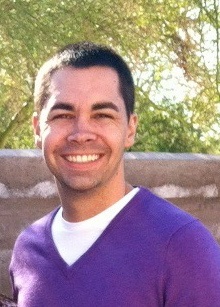
John Matthew (Jonny) Smith, Ph.D.
Assistant Professor
John Matthew (Johnny) Smith holds a Ph.D. from Purdue University. He came to Georgia Tech in fall 2012 as a postdoctoral fellow and was recently appointed assistant professor in Sports History. He will teach modern U.S. history and a variety of foundational courses in the Sports, Society, and Technology undergraduate program, which he will coordinate.
The Sam Nunn School of International Affairs
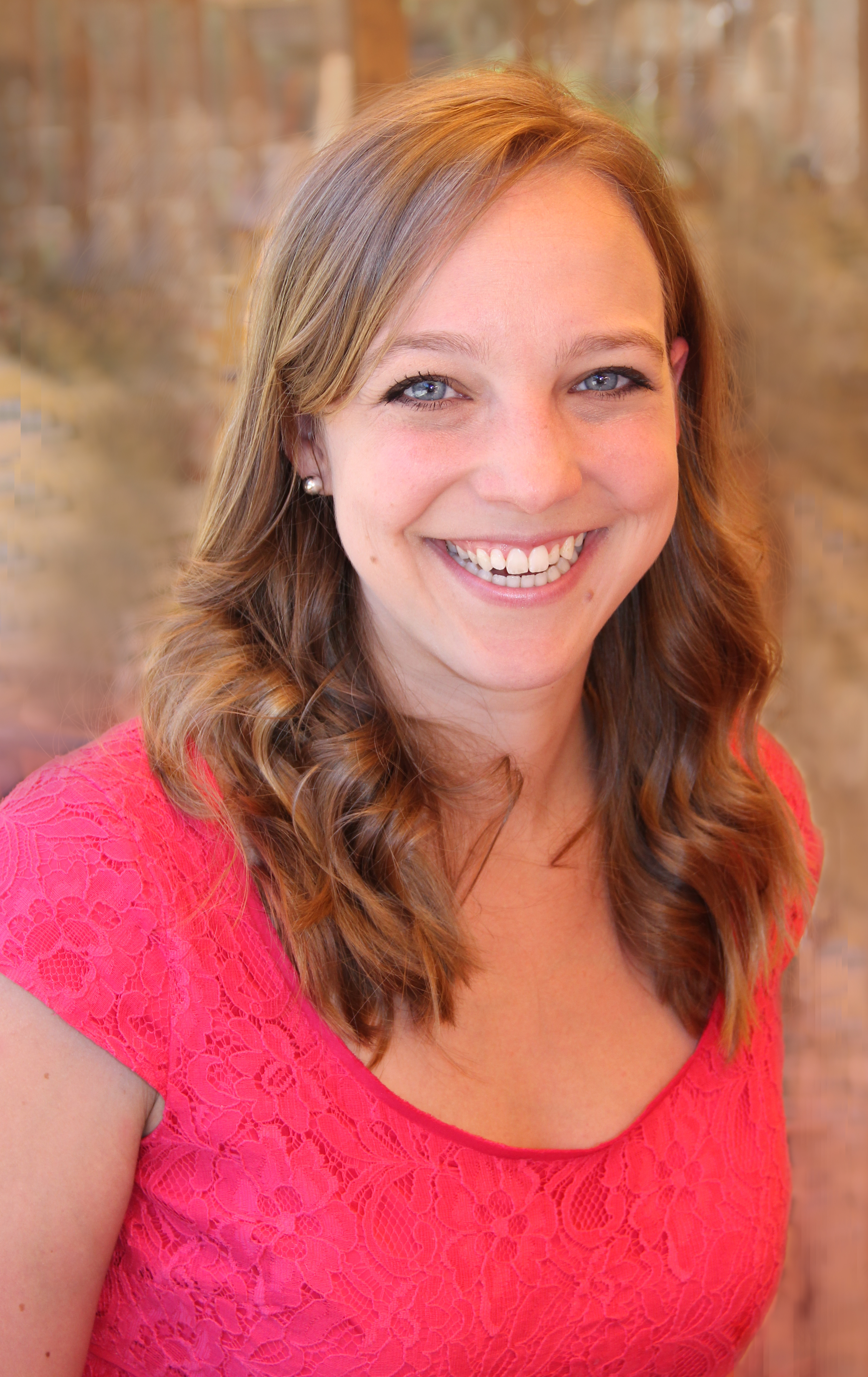
Mariel Borowitz, Ph.D.
Assistant Professor
Mariel Borowitz holds a Ph.D. in Public Policy from the University of Maryland, an M.A. in International Science and Technology Policy from the George Washington University and a B.S. in Aerospace Engineering from the Massachusetts Institute of Technology. Her research and teaching specializations include technology policy and space policy.
School of Literature, Media, and Communication
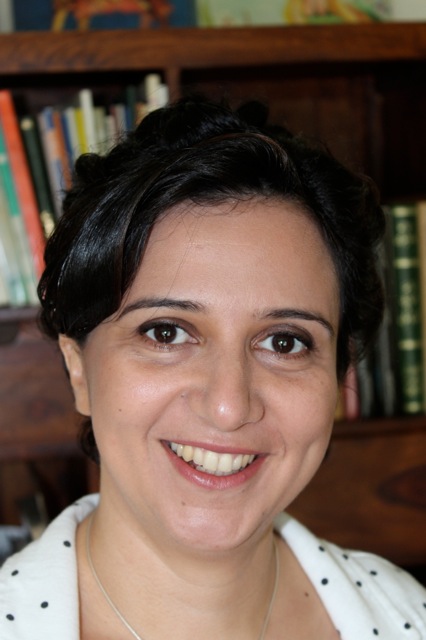
Nassim JafariNaimi, Ph.D.
Assistant Professor
Nassim JafariNaimi received her Ph.D. in Design from Carnegie Mellon University and holds an M.S. in Information Design and Technology from Georgia Tech. Her research interest is in the ethical and political implications of emerging technologies. More specifically, she examines the experiential and participatory dimensions of social media and their relationship to establishing and supporting democratic forms of social interaction.
School of Modern Languages
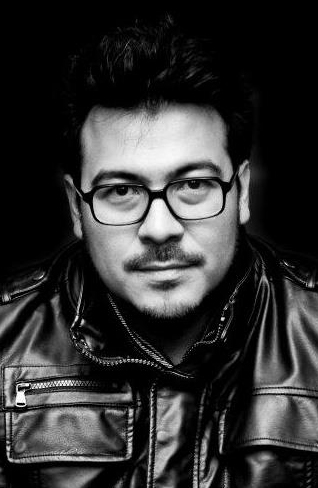
Paul Alonso, Ph.D.
Assistant Professor
Paul Alonso is a Peruvian journalist and author. He holds a double master’s in Journalism and Latin American Studies, and a Ph.D. in Journalism from the University of Texas at Austin. His academic research focuses on the convergence of journalism, entertainment, satire, politics and popular culture. Alonso has also been a staff member of the Knight Center for Journalism in the Americas since 2004.
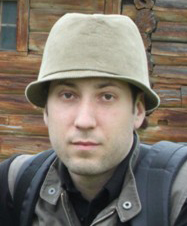
Yasha (Yakov) Klots, Ph.D.
Assistant Professor
Yasha (Yakov) Klots received his Ph.D. in Russian literature from Yale University in 2011 and an M.A. from Boston College in 2005. Before joining Georgia Tech, he taught at Yale and at Williams College. His research fields are contemporary Russian poetry, émigré literature and culture, linguistic anthropology, bilingualism, literary translation, Gulag narratives, urbanism, the mythology of St. Petersburg, and the representation of other cities in Russian literature.
School of Public Policy
 Matej Drev, Ph.D. Matej Drev, Ph.D.
Assistant Professor
Matej Drev is an applied economist whose research focuses on economics of technological innovation and international economics. He joins the college as an assistant professor in the School of Public Policy. Drev completed his Ph.D. at Carnegie Mellon University in 2013, where he was affiliated with the Heinz College and the interdisciplinary Strategy, Entrepreneurship, and Technological Change research group.
|
Project ENGAGE initiative followed on WABE
|
|
Finding paths into the so-called STEM fields – Science, Technology, Engineering and Mathematics – remains especially challenging for minorities. But a first-of-its kind program between Georgia Tech and two single-gender Atlanta high schools is working to change the trend. Project ENGAGE (Engaging New Generations at Georgia Tech through Engineering), an initiative of the Westside Communities Alliance, is an internship program which allows local high school students to actively participate in scientific research under the guidance of Master's and Ph.D. students and faculty members. Students will complete the internship over the course of the 2013-2014 school year. The goal of the program is two-fold: to raise high-school student awareness of the biotechnology world through hands-on research projects and to improve the schools’ current science education program through the teacher training initiative. Listen as Jim Burress, reporter and host for WABE, follows the progress of students over the course of their year in Project ENGAGE. |
IAC Students elected to Student Government Association
Undergraduate students Trevor Lindsay, Jordan Lockwood, Mary Shoemaker, and Kevin Guebert were elected to the Student Government Association (SGA). These students are putting their education into practice to serve the Georgia Tech undergraduate student body.
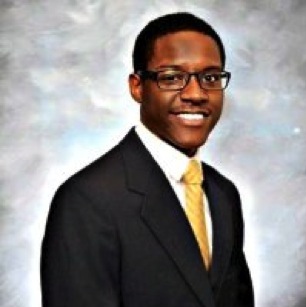 Trevor Lindsay – Vice President of Finance Trevor Lindsay – Vice President of Finance
The only underclassman in the Cabinet, Trevor Lindsay is a second year Economics major. Trevor will oversee and advise in the allocation of the Student Activity Fee, which amounts to over $5 million. Trevor compares his responsibilities to those of the Secretary of Treasury, and says “I’m looking forward to putting what I learned about fiscal policy in my macroeconomics classes to use this year.”
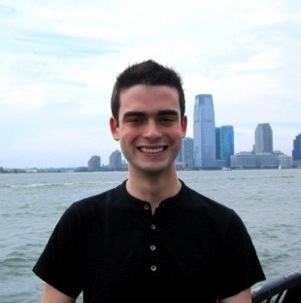 Jordan Lockwood – Vice President of Communications Jordan Lockwood – Vice President of Communications
Jordan Lockwood, a fourth year Public Policy and Business Administration major. He’ll be working with other cabinet members to direct the administration’s efforts to some substantial initiatives from the executive branch including mental health support, a conference fund to promote undergraduate research, development of LGBT resources, and an IT services overhaul. Jordan says that the Public Policy curriculum has given him the background to design and implement these initiatives in a position like VP Comm that depends on planning and analysis for success. Jordan is excited to start working on these projects and says “This is going to be a great year for SGA and for Georgia Tech students!”
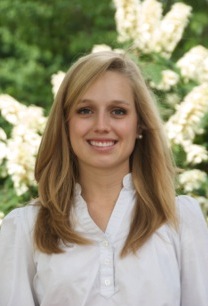 Mary Shoemaker – Director of External Affairs Mary Shoemaker – Director of External Affairs
Mary Shoemaker is a fourth year Public Policy major. Her office has many facets, including cultural exploration and community involvement. Mary says she is especially excited about the political component of this position, working with her committee chairs to facilitate a dialogue between students and public leaders to promote active citizenship. Mary says she “looks forward to connecting GT students with political and cultural opportunities throughout Atlanta!”
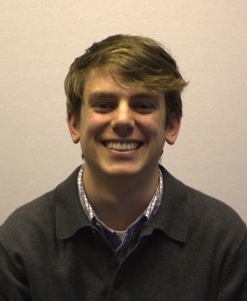
Kevin Guebert – Director of Information Technology
Kevin Guebert is a third year Computational Media student. His role focuses on maintaining SGA’s technology resources, including the SGA website, course critique, and JacketPages. Additionally, Kevin will work with SGA initiatives to develop new resources for students and other members of the Georgia Tech Community. Kevin says, “My Computational Media major has already been helpful, because this job is not just about the technical side, but also about the design and practice aspect of these technologies.”
|
John Lewis Honored in 100 Most Influential Atlantans of 2013
|
|
Congressman John Lewis, was named by the Atlanta Business Chronicle among the 100 Most Influential Atlantans of 2013. Lewis was a recipient of Georgia Tech's Ivan Allen Jr. Prize for Social Change and recognized during the Allen Prize Symposium and award luncheon hosted by the college April 4th. Long recognized for his civil and human rights leadership, Lewis has represented Georgia's 5th district since 1986. |
|










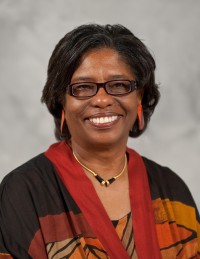
 This visit underscores the timeliness of the
This visit underscores the timeliness of the 

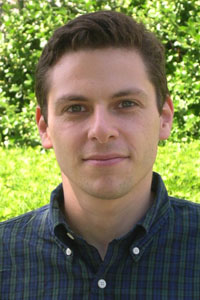
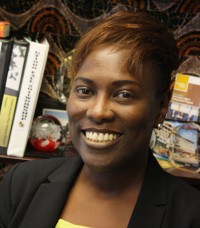


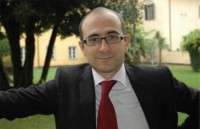


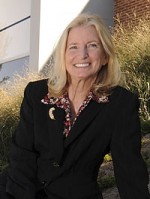









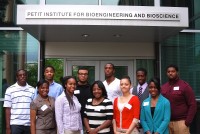
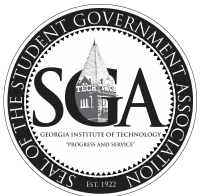
 Trevor Lindsay – Vice President of Finance
Trevor Lindsay – Vice President of Finance Jordan Lockwood – Vice President of Communications
Jordan Lockwood – Vice President of Communications Mary Shoemaker – Director of External Affairs
Mary Shoemaker – Director of External Affairs

